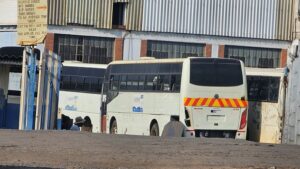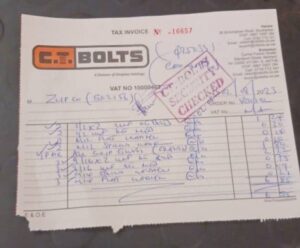Miriam Mangwaya
Harare—The Zimbabwe United Passenger Company (Zupco) headquarters in Harare’s Belvedere suburb resembles a junkyard with broken down buses taking up most of the space at the depot.
Tens of buses awaiting repair are almost covered by the overgrown dry grass amid revelations that some have been parked for several months.
The broken down buses are crowding out functional vehicles, which have had to be parked outside, along Bishop Gaul Avenue.
An investigation by The Standard in partnership with the Information for Development Trust (IDT), a non-profit organisation supporting investigative journalism in Zimbabwe and southern Africa, showed that the situation at the depot is indicative of serious rot at the parastal.
Zupco, whose ability to continue as a going concern was questioned by the auditor general (AG) in a report released in June this year, is failing to repair buses including those that the government has been importing from China and Belarus since President Mnangagwa came into power in late 2017.
The public transporter incurred a $3.8 billion loss in 2020 and the latest auditor general’s report casts “significant doubt about the company’s ability to continue as a going concern.”
Its parlous state is making it difficult for the public transporter to buy spares to fix the broken down buses.
Festering corruption
This has spawned festering corruption among its employees, especially drivers, who are desperate to keep their jobs, investigations by this publication have revealed.
Zupco is a government-owned road transport company with the mandate to provide rural, urban and regional passenger transport services.
It runs its activities through two main divisions, namely the northern region based in Harare and southern region based in Bulawayo.
Zupco’s fleet comprises 85-seater Golden Dragon buses, 65-seater Golden Dragon Bus Double Axies, Volkswagen Volksbuses, Mercedes Benz 1730, Marcopolo G6 Torinos and FAW.
The size of the bus fleet is said to be at 467 and the government says it plans to import 500 buses in 2024, with 150 coaches having been scheduled for delivery by the end of last year.
It, however, emerged during investigations that a huge part of the fleet including those imported after Mnangagwa came into power through a coup in 2017 are literally gathering dust at the Zupco depots, including in Belvedere.

Some of the buses were purchased through a murky deal between the government and Landela Investments, which is linked to Mnangagwa’s advisor Kudakwashe Tagwirei.
Landela Investments allegedly bought 162 buses from China for US$58 900 each before selling them for US$212, 962 per bus.
The government has refused to release details about the deal even after the High Court ordered it to do so last year following litigation by our sister publication, The Zimbabwe Independent.
Zupco drivers disclosed that at times when their allocated vehicles break down they use their money own money to buy spares to avoid being rendered redundant due to long delays in bringing back the buses on the road, which has become common.
Buses can be off the road for several months once they breakdown and for the unlucky drivers their allocated vehicles are never repaired due to Zupco’s cashflow crisis.
Other drivers said they bribe mechanics to fast track the repair of their allocated buses.
Zupco is said to have a salary backlog stretching six months.
Drivers said they were now relying on US$10 daily allowances that are only paid to those on duty only.
This, it was established, has spawned desperation among the drivers, who now have to use all available avenues to remain on the road.
A win-win situation
An internal Zupco document obtained by The Standard showed that in one incident a driver had to fork out US$7 to buy rivet bolts at a motor spares shop in Harare’s central business district so that his allocated bus could be repaired.
Zupco buys spare parts for its fleet through Central Mechanical and Equipment Department (CMED), but drivers and mechanics are now circumventing the process as a result of frustrations over delays in repairs.
One of the drivers said he was forced to part with money to get his allocated bus repaired for him to return to work.

“There was no money to replace the rivet bolts that cost less than US$10,” the driver said.
“I had to pay for the bolts so that the bus is fixed and that happened within two days. “I then went back to work.”
Communication between some Zupco drivers through the WhatsApp platform showed that they were paying CMED mechanics bribes to expedite the repair of buses.
The drivers complained about alleged mismanagement at Zupco, which they said had seen many buses being grounded.
“The mechanics complain that they are overwhelmed by the number of buses that they have to repair, hence the backlog of buses awaiting repair,” another driver said.
“At times you can wait for up to five months for a bus to be fixed as the mechanics are demoralised.
“We pay them US20 so that they can prioritise our buses when they break down. It’s a win-win situation because I will get my bus back on the road and I get my allowance.
“The mechanic also gets something as part of the deal.”
Quinto Kanhukamwe, the Zupco board chairperson, referred questions to the parastatal’s CEO Tinei Rwasoka, who demanded questions in writing but did not respond.
It was also the same case with Local Government permanent secretary, John Bhasera.
Fixing FAW buses
In previous audit reports on Zupco, the AG’s office raised concerns about delays in fixing broken down FAW buses that were lying idle at the parastatal’s depots.
In the latest report, it said noted that “17 buses have been refurnished and registered. Ten buses were still work in progress.”
John Maketo, the Zimbabwe Coalition for Debt and Development programmes manager, said lack of transparency in Zupco’s procurement process was fueling corruption.
“We have been tracking the conduct of Zupco in providing public transport services and it all points to poor governance,” Maketo said.
“The main issue of concern is the procurement process at Zupco, which is mainly centred on tenderpreneurship.
“There is flouting of tender process and payment of kickbacks which has resulted in the country buying buses that have not been tried and tested elsewhere.
“The procurement processes need to be addressed to enhance accountability in expenditure of public funds.”
The government has come up with several interventions in an effort to resuscitate Zupco, including creating a monopoly in the urban public transport system during the Covid-19 era.
In March 2020, the government banned private bus and commuter omnibus operators and made Zupco the only approved public transport provider.
The ban, which was reversed by the High Court last year, spawned a major public transport crisis in urban areas which still persists.
Buses not visible on roads
Zimbabwe Women Against Corruption Trust executive director Sandra Matendere said it was disturbing that there was a shortage of public transport vehicles when the government had invested heavily on buses on behalf of Zupco.
“We have seen hundreds of buses, which were allegedly purchased by government to ease transport challenges in the country but to our surprise, the buses are not visible on the roads,” Matendere said.
“Women and girls are left at the mercy of touts, who harass them and at times they lose their valuable items during the process.
“We are deeply concerned about the conduct of touts, especially along the Bulawayo-Harare highway.
“We have received various reports from women who were harassed there.”
The AG’s audit report for the year ended December 2022 noted a number of accounting deficiencies at Zupco that it said might have resulted in serious leakages.
It said Zupco had no proper records for buses and commuter omnibuses it was hiring from private players to complement its fleet.
“The company was not maintaining proper accounts payable records for bus operators who were leasing out buses to Zupco,” the report said.
“In addition, payments made to bus operators during the year were not supported by invoices and supplier statements.
“I also noted that management was processing payments using manual records maintained by the depot managers, which were not adequately supported.
“As a result, there were variances amounting to $241.9 million between balances disclosed in the financial statements and balances in the company records.
Zupco has a long history of corruption scandals that are often instigated by politically exposed persons.
Co-published by The Standard


Comments are closed.